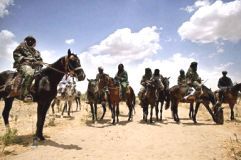Three militiamen sentenced to death for Darfur crimes
KHARTOUM, Sept 26 (AFP) — A court in Sudan’s troubled Darfur region has sentenced three militiamen to death and six others to up to five years in prison for murder and pillage, the pro-government Sudanese Media Centre said on Sunday.
 “The three militiamen were sentenced to death by hanging after they were found guilty of murder, pillage, arson and illegal possession of arms in South Darfur state,” the news agency said.
“The three militiamen were sentenced to death by hanging after they were found guilty of murder, pillage, arson and illegal possession of arms in South Darfur state,” the news agency said.
“Six others were sentenced to prison terms of between three and five years for involvement in the same crimes,” it said without giving further details.
Forty more people are due to be tried in the next couple of days for similar crimes at the special court in the state capital of Nyala, it added.
The Khartoum government set up the court to try pro-government militiamen accused of crimes in Darfur, after undertaking in June to disarm the militias and bring those responsible for human rights violations to justice.
In July, 200 militiamen accused of ethnic cleansing in Darfur were tried by the same court with some receiving death sentences.
The fighters from different Arab tribes were found guilty of waging war, assault and armed robbery.
The Sudanese government in August gave the United Nations a list of 30 of its militia and police allies in Darfur suspected of having committed serious human rights abuses, including rape.
“The government does not deny that human rights abuses occur and it will not protect those who commit them,” Justice Minister Ali Mohammed Osman Yassin said at the time.
Despite the government’s undertakings, the crisis in Darfur continues to simmer, with those in displaced persons’ camps continuing to accuse the militias of serious abuses.
The United Nations has called Darfur the world’s worst current humanitarian crisis, and the United States and Germany have described the brutal campaign waged by state-sponsored Arab militias in Darfur as “genocide.”
The bloodshed began in February 2003 when rebels rose up against Khartoum to demand an end to the marginalisation of their region — mainly peopled by non-Arab minorities and one of the poorest in Sudan.
The Sudanese government’s response to the uprising was to give Arab militias known as the Janjaweed a free rein to crack down on the rebels and their suspected supporters in minority villages.
